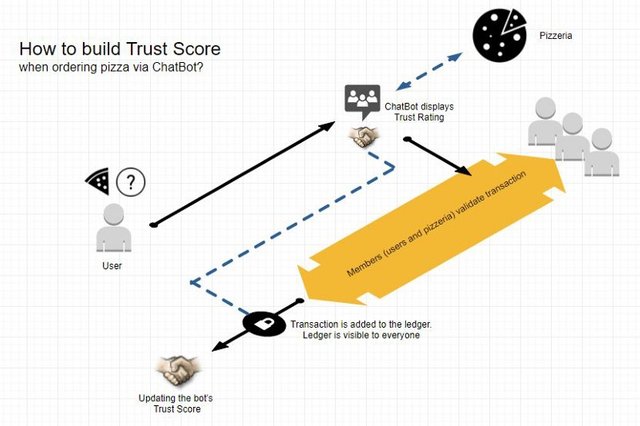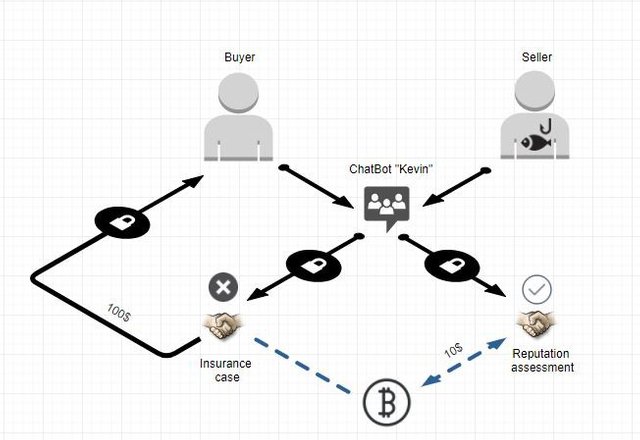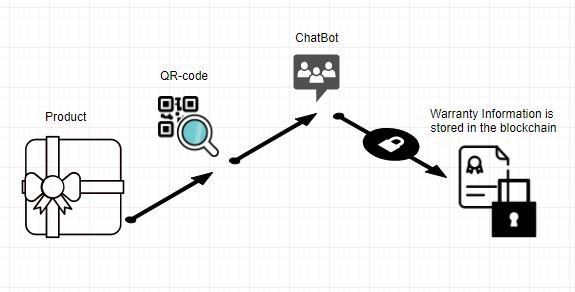Chatbots and blockchain are a perfect match
It is a fact that we nowadays live in the digital era. Even at this moment we prefer to scroll web pages via computer, laptop or smartphone instead of using old fashioned printed publications.
Everyone got used to working with popular digital helpers, starting with the funny “paper clip” helper from the initial Microsoft Word versions with the “question-answer” menu and finishing with voice assistants developed by giant corporations such as Apple, Google, and Amazon. Providing such assistants with an access to your bank account one does not have much choice but to rely on the company’s reputation and expect it to be honest.
Is making payments with the help of chatbots in the social networks safe? Would you entrust your bank card information to a chatbot you are using for the first time?
Chatbots and Trust
Before you answer in the affirmative, let’s think about serious risks that constantly grow with the spreading popularity of the chatbots. Humans are essentially social beings, that is why interacting with kind and friendly man-made computer programs increases the danger of phishing. The lack of mutual understanding and frequent cases of unscrupulous chatbots may cause distrust towards the technology and rejection to use it at all.
The attackers continue to improve their methods and unfortunately often succeed in plenty of illegal affairs. Some create technical support websites pretending to be a well-known IT-service company and even invest in search optimization of these fakes. Preferring not to download several separate apps to the device, users provide their personal data to counterfeit chatbots and become a victims of fraud.
How does a user know that an automated helper can be trusted? When they see the bot’s interface for the first time natural doubts appear. But what if a customer could see the chatbots history of successfully confirmed transactions? That might strongly influence the decision of the client to cooperate.
The blockchain technology is a perfect choice if we speak about trust. It is essentially a decentralized tracker of transactions and a secure way to provide your bank account information due to a multi-step verification process.
Blockchain and Reputation
Using distributed ledger technology (DLT) for confirmation of reliability totally differs from the feedback evaluation systems. It shows how many actual transactions were successfully made and confirmed by the members of a register — the real and existing chatbot users.
Depending on the processes that took place, the bots can be assigned the trust rating scored for a quantity of successful transactions, duration of the bots activity, timing of the last deal, diversity of users in terms of geographical situation and even average time of customer interaction.
With DLT technology used as a base for such trust rating system, we can create the mechanism that indicates a value of trust for the chatbot and provides the user with the unique opportunity to measure risks before accepting the deal.
Suppose the customer wants to order a pizza. The chatbot representing a variety of pizzerias is available in all popular messengers. After a pizza is chosen it is time to make a payment and the question stands, whether the chatbot can be trusted and is it safe to transfer money with its help.
At that moment, the customer can indicate the security level via trust rating based on the number of previously ordered and successfully received orders.
After a successful order, the date, time and the unique payment identifier are noted down in the distributed ledger. The personal and identified data is not recorded in the register. Once all the participants confirm the transaction it will be recorded in the register and will influence the trust rating of the specific chatbot in the future.
The trust rating based on data from the distributed ledger would provide the customers with an opportunity to minimize the risks of attacks not only while ordering pizza. The users would be able to make reasonable decisions before sending their important and confidential data. It is important to point out that the trust rating information is based on the real transactions made by the customers which increases the transparency of the service.
The increased level of trust will lead to the respectively higher interactivity level between user and technology. The chatbot may use the developed rating model as a base for the new services and for the evaluation of the interaction between each other while making the deals automatically in the near future.
Blockchain and insurance
The pizza situation was the simplest example (let the pizza makers care about food quality), but the trust evaluation system can be easily scaled to reputation evaluation system (e.g. while shopping via the Internet).
That is how chatbot “Kevin” from Spanish startup Traity works. It provides microinsurance for P2P- transactions and takes the role of an arbitrator during the deal. Using blockchain and cryptocurrency transactions the bot proves its payability. When a purchase is made using one of the electronic platforms (for example Craiglist or Gumtree), the chatbot verifies the reputation of buyer and seller in the database searching for potential problems in previous deals. It also fixates the time of transaction and of reputation check.
If the verification is successful, the bot buys bitcoins equal to $10 which becomes the insurance leverage (Kevin is intended to insure the transactions under $100). Once the deal is successfully closed, the bot sells the bitcoins and suggests to mark the reputation of both parties — from 1 to 5 points. A number of deals and the high average score proves the user’s reputation.
You can complain anytime — if the deal fails, the information about a $100 insurance payment is fixated in the bot’s public balance sheet. The balance transparency and fixation of the deal via blockchain shows the users of the chatbot the liability of credit system. Currently, the bot works in test mode, so it does not require any payment for its services yet.
Chatbot Kevin is a partner which helps make the experience of interaction with online marketplaces much better. You may use it only once a year, but it may as well potentially change the way of cooperation with the insurance companies.
This particular chatbot was primarily developed for trading platforms that do not cover insured events from their own pocket. Only huge companies, such as AirBnB or Uber, have their own risk insurance systems.
Blockchain and warranty service
In the previous examples, blockchain helped chatbots be more trustworthy while ordering pizza and made the microinsurance system a bit better. Such decisions, however, can be easily applied to a large business.
Another issue is warranty service of products. People tend to lose, forget or throw away the standard guarantee service coupon. It is hard to underestimate the importance of cooperation with warranty service clients.
The Deloitte company developed the working structure for the chatbot using blockchain. The guarantee chatbot is an automated service that helps register the warranty coupon and coordinates the work with clients.
How does it work? The client receives a purchase with a guarantee coupon with a unique QR-code on it. It includes the general information (name of the product, date of purchase, serial number etc.) and the address of the chatbot operating on Facebook Messenger platform.
Once the chatbot is sent a picture of a QR-code, the purchase information will be saved and there will be no reason to keep the printed copy. The Facebook profile of the customer serves as a personal identifier. Applying the QR-code also saves time: the seller does not have to fill out the coupon — the code can be just printed on the check.
After the registration, the chatbot provides the client with the list of all purchases, guarantee terms and the opportunity to employ additional services. Due to the data storage in the blockchain, you can track the complete history of the guarantee service without the need to keep the coupons or search the payment information.
This becomes really important when you buy pre-owned things. A unique identifier of goods enables you to track the changes and guarantee services provided previously and stay confident in the accuracy of information.
Thus, the client can monitor all possible changes in the status of the product. This increases the trustworthiness of the brand and provides a new opportunity to interact with the customer. However, the type of goods does not matter in this case — the digital storage with a dedicated chatbot can strongly influence the sales industry.
It is also possible to implement the technology that recommends the extra services such as getting insurance or buying additional goods based on sales history available to the user.
A certain platform the chatbot is working on will not serve as a restriction. Also, a user will not have to upload different apps from every seller.
The combination of blockchain technology and chatbots creates a reliable and, most important, safe system with a simple, user-friendly interface.
Chatbots and smart contract
Is there any other way for chatbots to apply blockchain? Byteball is a project that aggregates mobile services for working with cryptocurrencies. It helps a client interact with various chatbots which build different financial products by using the smart contracts.
Using the bots does not imply payment. Among their functions are sending and accepting cryptocurrency transactions. There is also the ability to view and create the smart contracts with the help of user-friendly interface.
The client does not have to consider all the specifics of the contract on their own. The Byteball chatbots reduce the barrier to entry and make their use easier.
The chatbot finds the most suitable option from the standard samples of smart contracts. The participants of a deal just need to read the terms and conditions of the contract and accept it before payment.
The structure of the smart contract is published right after its creation and is publicly available. This provides an opportunity to check the terms by the third party. The customers have all the information as to conditions and consequences of the contract. At the same time, the bot’s source code is public and not changeable.
This allows the chatbots to compete and the users to choose the best option from the variety of smart contracts.
In fact, chatbots become an interface for interaction and tracking the conditions of the contracts, while the blockchain and cryptocurrency serve as cryptographic parts of the chatbots operation.
Blockchain and chatbots are made for each other
The majority of previously presented examples is in the process of developing, which is not a surprise as blockchain is still a new kind of technology.
For financial companies, using the trustworthy chatbots opens a wide perspective. Instead of difficult systems of access to finances with multiple authorizations, the user would make the transactions directly with the help of a chatbot.
The clients would get rid of awkward conversations with the bank staff and would save time. Nowadays, the huge banks are planning to use online advisers. For example, Bank of America launched the electronic helper “Erica” and continues to collect technological patents related to the blockchain and cryptocurrency.
The chatbots and blockchain can aid the automation of marketing activity. The BRN.ai company currently develops a cloud platform which makes the process of collecting the information from the different chatbots in popular messengers (Facebook Messenger, Whatsapp, Telegram, Wechat etc.) significantly easier. The companies can communicate with the clients in real time and provide secure cryptocurrency transactions.
The insurance information, purchase history from various services, guarantee services — you can collect all that information using blockchain and work with different companies via chatbot without worrying about safety.
Chatbots and blockchain are made for each other and that is why the new services based on these trends will appear more and more often.




Hi! I am a robot. I just upvoted you! I found similar content that readers might be interested in:
https://chatbotsmagazine.com/chatbots-and-blockchain-are-a-perfect-match-99760ca4bcf8